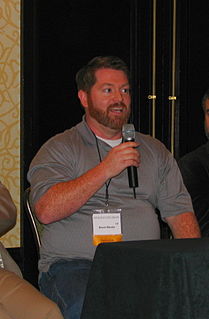A Quote by John Calvin
To 'justify' means nothing else than to acquit of guilt him (her) who was accused as if his own innocence were confirmed.
Related Quotes
It is more important that innocence be protected than it is that guilt be punished, for guilt and crimes are so frequent in this world that they cannot all be punished. But if innocence itself is brought to the bar and condemned, perhaps to die, then the citizen will say, "whether I do good or whether I do evil is immaterial, for innocence itself is no protection," and if such an idea as that were to take hold in the mind of the citizen that would be the end of security whatsoever.
Life is nothing in itself. It’s a place marker that proves who’s winning, and we are the winners. We are always the winners. There is nothing but the winning. Even winning means nothing. We win because it’s an insult to lose. The ends don’t justify the means. The means don’t justify the ends. There is no one to justify to. There is no justice.” ~ Durzo Blint
But even though she was attractive, there was something else about her that caught his eye. She was intelligent, he could sense that right away, and confident, too, as if she were able to move through life on her own terms. To him, these were the things that really mattered. Without them, beauty was nothing.
Marital faithfulness involves more than just sexual fidelity. Being faithful to your wife also means defending her and affirming her beauty, intelligence, and integrity at all times, particularly before other people. Faithfulness to your husband means sticking up for him, always building him up and never tearing him down. Marital fidelity means that your spouse’s health, happiness, security, and welfare take a higher place in your life than anything else except your own relationship with the Lord.
Focus on guilt will always breed fear, and focus on innocence will always breed love. Any time we project guilt onto someone else, we are fortifying the experience of guilt within ourselves. Like blood on Lady MacBeth's hands, we cannot remove our own guilty feelings as long as we are judging others.
He wanted her. He knew where to find her. He waited. It amused him to wait, because he knew that the waiting was unbearable to her. He knew that his absence bound her to him in a manner more complete and humiliating than his presence could enforce. He was giving her time to attempt an escape, in order to let her know her own helplessness when he chose to see her again.
...the girl longed for a love that could not be ended by death. From the time she was young, she knew that her true love was there, somewhere, living a life that would one day intersect her own. Knowing this made every day full of sweet possibility. Knowing that her true love lived and breathed and went about his day under her same sun made her fears vanish, her sorrows small, and her hopes high. Though she did not yet know his face, the color of his eyes, still she knew him better than anyone else knew him, knew his hopes and dreams, what made him laugh and cry.
Dantes passed through all the stages of torture natural to prisoners in suspense. He was sustained at first by that pride of conscious innocence which is the sequence to hope; then he began to doubt his own innocence, which justified in some measure the governor's belief in his mental alienation; and then, relaxing his sentiment of pride, he addressed his supplications, not to God, but to man. God is always the last resource. Unfortunates, who ought to begin with God, do not have any hope in him till they have exhausted all other means of deliverance.
He wants her in his bedroom. And not in that way — no girl has ever been in his bedroom that way. It is his private space, his sanctuary. But he wants Clary there. He wants her to see him, the reality of him, not the image he shows the world. He wants to lie down on the bed with her and have her curl into him. He wants to hold her as she breathes softly through the night; to see her as no one else sees her: vulnerable and asleep. To see her and to be seen.
Non-injuring has to be attained by him who would be free. No one is more powerful than he who has attained perfect non-injuring. No one could fight, no one could quarrel, in his presence. Yes, his very presence, and nothing else, means peace, means love wherever he may be. Nobody could be angry or fight in his presence. Even the animals, ferocious animals, would be peaceful before him.






































